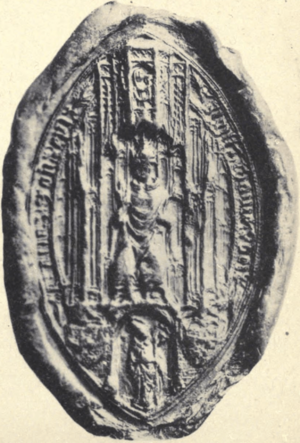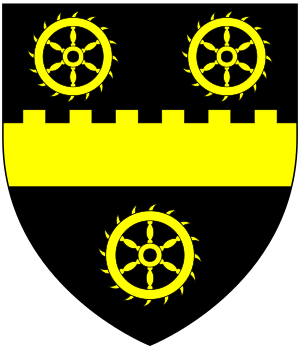Thomas de Brantingham facts for kids
Quick facts for kids Thomas de Brantingham |
|
|---|---|
| Bishop of Exeter | |

Seal of Thomas de Brantingham as Bishop of Exeter. The Bishop is the small standing figure below the enthroned king (Edward III or Richard II)
|
|
| Appointed | 5 March 1370 |
| Reign ended | 23 December 1394 |
| Predecessor | John Grandisson |
| Successor | Edmund Stafford |
| Other posts | Lord Treasurer Keeper of the Wardrobe |
| Orders | |
| Consecration | 12 May 1370 |
| Personal details | |
| Died | 23 December 1394 |
| Buried | Nave of Exeter Cathedral |
| Nationality | English |
|
Thomas de Brantingham
|
|
|---|---|
| Lord Treasurer | |
| In office 27 June 1369 – 27 March 1371 |
|
| Monarch | Edward III |
| Preceded by | John Barnet |
| Succeeded by | Richard Scrope |
| In office 19 July 1377 – 1 February 1381 |
|
| Monarch | Richard II |
| Preceded by | Henry Wakefield |
| Succeeded by | Robert Hales |
| In office 4 May 1389 – 20 August 1389 |
|
| Monarch | Richard II |
| Preceded by | John Gilbert |
| Succeeded by | John Gilbert |
Thomas de Brantingham (died 1394) was an important English church leader and government official. He served as the Lord Treasurer (a top financial job) for two different kings, Edward III and Richard II. He was also the Bishop of Exeter from 1370 until he passed away. Thomas de Brantingham came from the Brantingham family in North East England.
King Edward III helped Thomas de Brantingham get important positions in the church. From 1361 to 1368, he worked in France in key roles. Early in his career, he was the Keeper of the Wardrobe, which meant he managed the king's household expenses. He worked closely with William of Wykeham, another powerful figure. While Wykeham was in charge as chancellor, Brantingham became the Lord Treasurer for King Edward III (from 1369 to 1371). He held this important job again twice for Richard II (from 1377 to 1381, and in 1389). He was made Bishop of Exeter on March 5, 1370, and officially became a bishop on May 12, 1370. Thomas de Brantingham died in December 1394, likely on the 23rd, and was buried in the main part of Exeter Cathedral.
Thomas de Brantingham's Government Roles
By 1349, Thomas de Brantingham was working as a clerk in the Exchequer, which was like the government's finance department. In 1359, he was in charge of money during a military campaign in France. From 1361 to 1368, he was the Treasurer of Calais, managing the finances for the important French port city of Calais, which was then controlled by England.
On June 27, 1369, he was appointed the main treasurer of the realm. However, as the war in France became more difficult for England, he and other church officials, like William of Wykeham (the Chancellor) and Peter Lacy (Keeper of the Privy Seal), had to resign. This was because people were unhappy with how the war was going. Even so, in 1370, he was officially made the Bishop of Exeter.
Serving as Bishop of Exeter
While Thomas de Brantingham was the Bishop of Exeter, he received a request from people living in a place called "St. Tenion." This area was under the special control of St German's Priory. The people had been in a legal dispute for eighteen years with the Prior and Convent of St. German's. They wanted permission to have their own chaplain (a priest who serves a specific group or institution).
The people asked Bishop de Brantingham to help settle their long-running disagreement. Although his final decision on this matter is not known today, it shows that he was involved in helping his community and solving problems for the people he served as bishop.
His Personal Life and Legacy
Records show that Thomas de Brantingham died on December 13, 1394. He was buried in the nave (the main part) of Exeter Cathedral. In his will (a legal document about what happens to his belongings after he dies), he named Richard Brantingham and his wife, Joan, as beneficiaries. It's thought that Richard was likely his son.
Thomas de Brantingham also remembered the village of Brantingham, which was the origin of his family's name. He left the church in Brantingham either a pair of special vestments (religious clothes) or one shilling (a type of coin). He also left a book of church laws to two important colleges at Oxford University: Merton Hall and Stapledon Hall (which is now Exeter College, Oxford). His connection to Stapledon Hall was strong; he had given 20 pounds (a large sum of money at the time) to help build its library before he died. His will also mentioned William Hankeford, who later became a very important judge, the Chief Justice of the King's Bench. This shows how important Thomas de Brantingham was in society.
Richard Brantingham, who was likely Thomas's son, is mentioned in a survey from 1382 by Thomas Hatfield, the Bishop of Durham. Richard was a "suiter" or lawyer, and he owned a small piece of land in Auckland. Another relative, Walter Brantingham, who was a servant in Bishop Hatfield's kitchen, was given a special job in the forest.
 | James Van Der Zee |
 | Alma Thomas |
 | Ellis Wilson |
 | Margaret Taylor-Burroughs |


